
-
Find the right food for your pet
Take this quiz to see which food may be the best for your furry friend.
Find the right food for your pet
Take this quiz to see which food may be the best for your furry friend.
Featured products
 Small & Mini Savory Stew with Chicken & Vegetables Dog Food
Small & Mini Savory Stew with Chicken & Vegetables Dog FoodA delicious complement to the nutrition of Science Diet Small & Mini 7+ dog food
Shop Now Adult Healthy Cuisine Roasted Chicken, Carrots & Spinach Stew Dog Food
Adult Healthy Cuisine Roasted Chicken, Carrots & Spinach Stew Dog FoodDelicious roasted chicken paired with tender vegetables in a succulent stew
Shop Now Adult 7+ Perfect Digestion Chicken, Whole Oats & Brown Rice Recipe Dog Food
Adult 7+ Perfect Digestion Chicken, Whole Oats & Brown Rice Recipe Dog FoodScience Diet's breakthrough nutrition supports ultimate digestive well-being & healthy microbiome for dogs age 7+
Shop NowFeatured products
 Adult 7+ Tender Tuna Dinner Cat Food
Adult 7+ Tender Tuna Dinner Cat FoodWith delicious chunks in a decadent gravy
Shop Now Adult Savory Entrée Can Variety Pack Cat Food
Adult Savory Entrée Can Variety Pack Cat FoodPrecisely balanced nutrition with the delicious taste of savory minced chicken to help fuel the energy needs of cats during the prime of their life
Shop Now Adult 7+ Senior Vitality Chicken & Vegetable Stew Cat Food
Adult 7+ Senior Vitality Chicken & Vegetable Stew Cat FoodImproves Everyday Ability to Get Up & Go
Shop Now -
Dog
- Dog Tips & Articles
-
Health Category
- Weight
- Food & Environmental Sensitivities
- Urinary
- Digestive
- Joint
- Kidney
-
Life Stage
- Puppy Nutrition
- Adult Nutrition
- Senior Nutrition
Cat
- Cat Tips & Articles
-
Health Category
- Weight
- Skin & Food Sensitivities
- Urinary
- Digestive
- Kidney
-
Life Stage
- Kitten Nutrition
- Adult Nutrition
Featured articles
 Does My Pet Hate Me?
Does My Pet Hate Me?Learn tips for bonding with your pet if you've ever thought, 'My dog doesn't like me, or 'Why do I have a standoffish cat?'
Read More Why Are Dogs and Cats So Cute?
Why Are Dogs and Cats So Cute?If waggy puppy dog tails and furry kitten yawns make you swoon, you're not alone. Why are cats so cute? And, dogs too! Let's find out!
Read More Do Dogs and Cats have Belly Buttons?
Do Dogs and Cats have Belly Buttons?Learn whether cats & dogs have belly buttons like humans, what the function is, and if there are any health concerns associated with it.
Read More -


You hear a boom. Outside your window, the sky lights up with dazzling colors. As you move to take a closer look, your cat darts across the room, disappearing under the couch. You wonder: Do cats hate fireworks? Is your cat afraid of fireworks, or is this a standard case of the zoomies?
If your cat doesn't like change, anything unexpected or unfamiliar can prompt fear. And while fear of fireworks is more common in dogs, some reports suggest up to 30% of cats are afraid of fireworks. Here's what to know about cats and fireworks, including tips for keeping your kitty calm.
Why Are Cats Scared of Fireworks?
With each experience, cats learn what to expect in the future. To feel safe and confident, they need to have positive experiences repeatedly across similar situations. Since fireworks occur infrequently, you may not think about preparing your cat to feel safe ahead of their arrival. But why do fireworks bother cats, anyway?
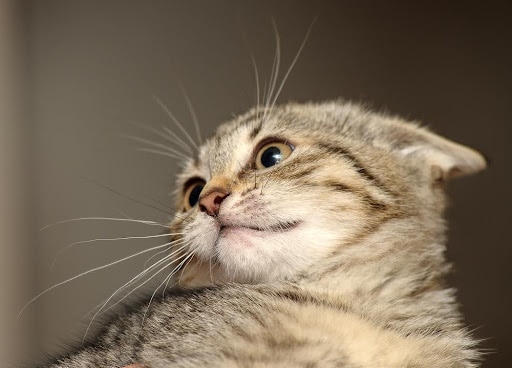
Bursts of Light
Cats pay closer attention to movement than static images. So, light streaking across the sky in bursts of sparkles can draw their attention. While this can serve as pure entertainment for many cats, others may quickly learn to associate the flashes of light with the loud, sometimes startling noises that accompany them.
Startling Noises
Cats have sensitive hearing, detecting sounds as high as 64,000 Hz. Falling into the ultrasonic range, cats can pick up sounds far out of the range of human hearing, including distant sounds your ears don't register. Fireworks snap, crackle, pop and boom, sometimes without warning. Some fireworks make rattling or whooshing sounds similar to windstorms. All this auditory commotion can overwhelm sensitive cats.
Unfamiliar Smells
Nearby fireworks may increase associated smells of burning, gunpowder or other incendiary materials that can smell scary (i.e., unfamiliar) to your cat. Cats' sense of smell is more refined than humans', too. Since cats identify friends and safe environments by their familiar scents, anything that smells different can put your kitty's tail in a twist.
Fear of the (Un)known
If your cat's never heard or seen fireworks, they may automatically categorize this unknown as potentially dangerous and scary. Cats traumatized by fireworks — meaning they've had negative experiences during fireworks or similar events, like thunderstorms — may be especially wary. The good news is it works both ways: Associating fireworks with positive experiences can eventually help cats overcome the instinctive fear response to the unknown.
Copycat Behavior
Cats learn from other cats (or dogs) and may copy their behavior. They may even become more fearful if you react to fireworks with fear.
Genetic Influences
Any cat can potentially become scared of fireworks, but sometimes there's a genetic component to fearful behavior.
Do Fireworks Hurt Cats' Ears?
While you shouldn't worry too much about your cat's ears from inside the home, repeated or prolonged exposure to loud noises can cause damage, including temporary or permanent hearing loss. According to hearing expert George M. Strain, your cat has built-in hearing protection deep inside the ear structure, decreasing sensitivity with noise-dampening "hairs."
Cats' brains also trigger two muscles inside the inner ear in a reflexive response to loud sounds, which protects the inner ear from noise damage. However, this mechanism isn't fast enough to protect your cat's ears from percussive sounds like fireworks.
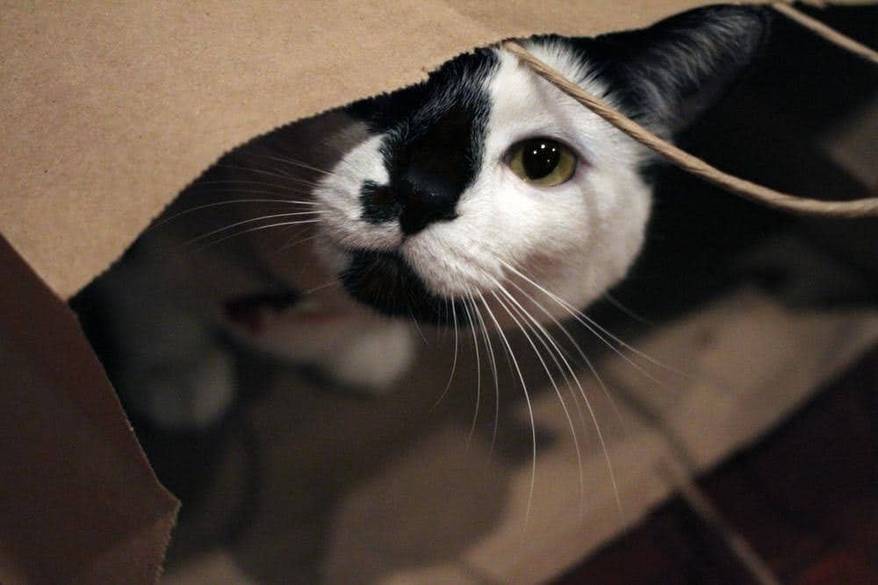


Tasty Tips
Signs Your Cat's Afraid of Fireworks
Cats can show various signs of fear and stress, though none are specific to cats and fireworks. You may notice one or more of these cat behaviors and body language:
Showing dilated pupils
Over-grooming
Vocalizing (meowing excessively, hissing, growling)
Hiding in dark, confined spaces
Crouching or moving low to the floor
Trying to escape
Drooling or panting
Missing the litter box
How to Keep Cats Calm During Fireworks
There's no tried-and-true solution for all cats, but it's worth giving these tips for how to calm cats during fireworks a try.
Offer Comfort, but Don't Force It
If your scared cat wants to snuggle or hide under a blanket on your lap, let them. However, don't force interaction. Many cats prefer to hide during scary situations, and that's OK. Leave it up to your cat!
Provide Plenty of Hiding Spots
Frightened cats typically want to hide in a dark place. Offer several cozy options, and let your cat decide to come and go — or camp out for the duration in a cat cave atop a cat tree, a tunnel or a familiar cat carrier.
Block the Light
Draw the window shades or temporarily cover them with paper or cardboard. This prevents your cat from seeing the flashes of light that may rev up their fright.
Mask the Sound
Wondering how to block out firework noise for cats? While you can't achieve perfect silence, you can muffle the noise with white noise machines or music designed to calm pets.
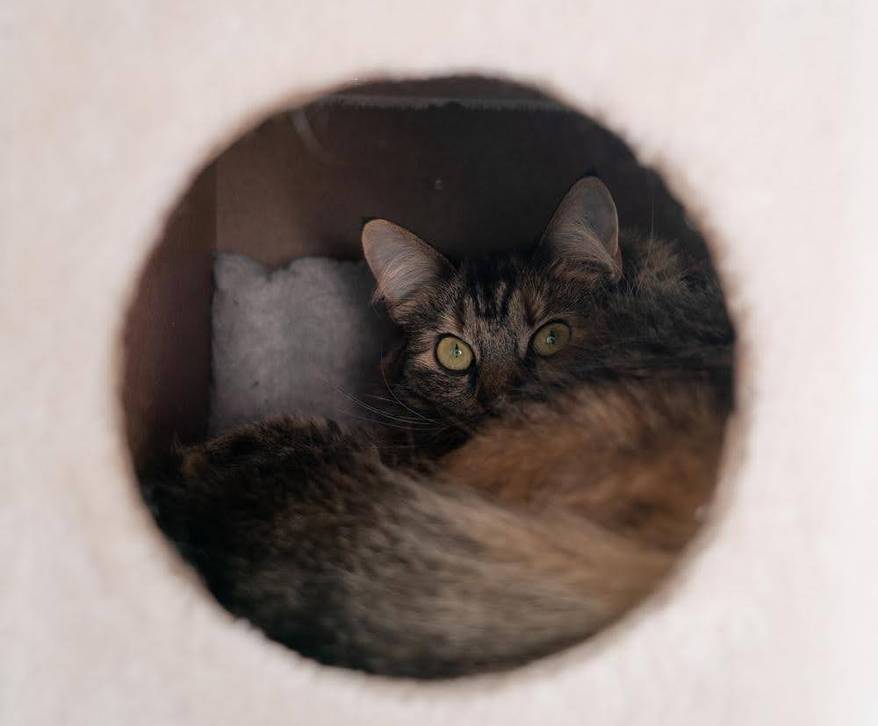
Try Calming Remedies
Cats produce cheek pheromones that mark territory as safe. Pheromone products, such as plug-in diffusers and sprays, mimic this calming effect and can relieve stress for many cats. If you're expecting fireworks in your neighborhood for a holiday or other event, start using them a couple of days in advance.
Some cats also respond well to snug vests, designed to calm pets during noisy events like thunderstorms and fireworks by applying light pressure. Not all cats accept them, however, so don't force it.
Consult Your Vet
Severely affected cats may harm themselves by licking themselves bald or causing injury. If your cat is very stressed, consult your veterinarian. They can prescribe medications or recommend other strategies to help relieve stress and keep your kitty calm and safe.
Some cats may also benefit from calming over-the-counter supplements. Ask your vet for the best option for your fearful kitty before trying anything out.
Taking the Fear out of Fireworks
You can't cure cats afraid of fireworks, but you can prepare in advance and build positive associations that can reduce fear over time. When it comes to how to help cats with fireworks, monitor your cat for signs of stress, promote a calm, soothing environment and allow them to decide where they feel safest. If you need support, reach out to your vet for advice. As long as your cat is safe and secure indoors with you — their loving cat parent — they're off to a good start.


Amy Shojai, is a certified animal behavior consultant, and nationally known authority on pet care and behavior. She began her career as a veterinary technician and is the award-winning author of more than 35 prescriptive nonfiction pet books.
Related products
Related articles
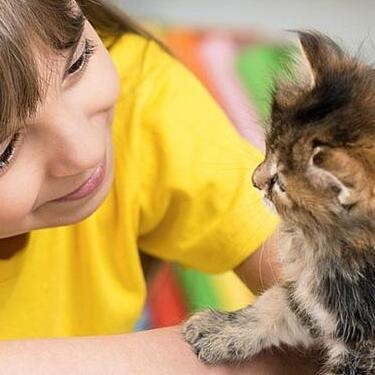
Discover how to train your cat, starting with very basic first steps that both reward good behavior and discourage the bad.

What is the best food for an overweight cat? Learn all about weight control food for cats, including what's in it and how it works.

How do you get a cat to lose weight? Learn all about cat foods for weight loss, including how to choose weight control cat food and exercise tips.
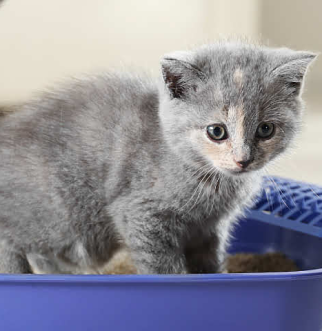
Cats are naturally very clean and chances are your kitten will already have learned how to use the litter box from her mother before she comes to live with you.

Put your cat on a diet without them knowing
Our low calorie formula helps you control your cat's weight. It's packed with high-quality protein for building lean muscles, and made with purposeful ingredients for a flavorful, nutritious meal. Clinically proven antioxidants, Vitamin C+E, help promote a healthy immune system.
Put your cat on a diet without them knowing
Our low calorie formula helps you control your cat's weight. It's packed with high-quality protein for building lean muscles, and made with purposeful ingredients for a flavorful, nutritious meal. Clinically proven antioxidants, Vitamin C+E, help promote a healthy immune system.

